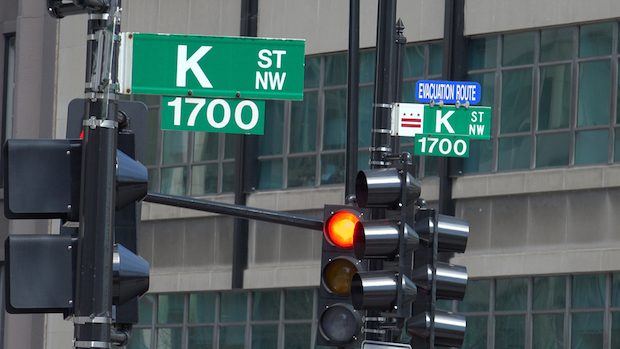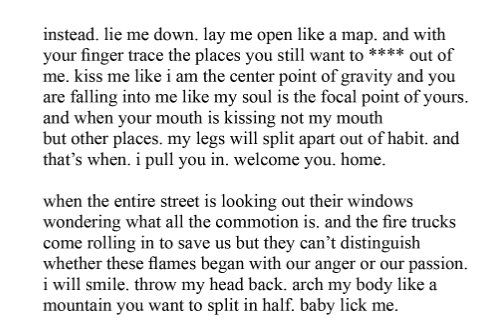Notes From Washington

Please forgive my sparse posting over the last day or so. I’m in Washington for an editorial meeting at TAC. It was a short, last-minute trip, and I’ll be headed back to the Great State after the meeting is over this afternoon. But I have had some great conversations here, some of which I want to share with you, because they touch on themes we talk about a lot on this blog.
Had drinks with A., who, in early middle age, is becoming more socially conservative, and is even thinking of formally converting to Catholicism. She told me that as she gets older, she realizes that so much of what makes a free society work depends on certain shared beliefs and customs. The fragmentation of our society — we talked about this happening in a number of areas — and gaming out where this is likely to go, has compelled her to consider more seriously the attraction she has long had to religion, but never really acted on.
***
“I have so many friends who are into polyamory,” said B., over dinner. “Not me, but lots of people, mostly non-religious. They see it as normal.”
“This is a thing?” I asked.
“Oh, very much so,” she said. “I guess they don’t want to tie themselves down. Some of them are married.”
B. is an Ivy-educated Millennial.
“Did you ever read the novel The Ice Storm, or see the movie?” I said.
“No.”
“It’s about swinger culture in the early ’70s, pretty much told from the point of view of the kids. That’s how I remember it, anyway. It’s devastating. And here we are, repeating it.”
***
I walk back from dinner through downtown Washington, from Chinatown to my hotel on Dupont Circle. It was a long walk, and my back hurt, but I needed it. I walked these streets in my mid-twenties, and thought I was in a kind of paradise. Now it seems so foreign to me, and unattractive. I’m not sure why.
Then I think of my late sister Ruthie, and the work she did in tiny West Feliciana Parish, and the life she had there. Surely there are people all over this city who long for what Ruthie had, but who couldn’t bring themselves to leave the proximity to power that comes with life in Washington.
I used to be swept up in that romance, back in the early 1990s, when I lived here. Here I was, in the Most Important City In The World, participating in its life. I thought as I walked about the young pastor here who told me back in 2012 about how much sadness and frustration he has to deal with among his congregation of ambitious young professionals.
He brought up the story of one young woman he had been counseling for some time. She had two advanced degrees, and was working her way up the meritocracy. Yet she was miserable, utterly miserable, and she didn’t understand why. Hadn’t she done everything that was supposed to make for a happy life? Why wasn’t she happy?
“The truth is, she wants to be married and to have a family,” said the pastor. “I’ve been working with her long enough to know that that is her heart’s desire. But she’s not ready to hear that yet. Everything about the culture that formed her, and everything about the culture she lives in here in Washington, tells her that would mean failure.”
On the other hand, I know plenty of good people doing good and important work in Washington. If it’s true that people can screw themselves up royally with a bad case of Potomac fever, it’s also true that reflexive hatred of Washington is both unfair and unattractive. Somebody’s got to govern us. For me, life used to be here, and isn’t anymore. I decided I was glad I had Washington in my twenties, and am grateful that I don’t have it anymore.
By the time I made it back to my hotel, I realized how stupid it was to take that long walk, given the situation with my back and neck from the car accident last week. Fortunately, they make meds for that. A fifty-year-old body is not the same as a twenty-five-year-old body. So that’s one measurement of the distance between the man I was when Washington was fresh and the staleness I find here now.
***
I repeat B.’s story about polyamory to C., another Millennial friend, a single Christian guy who works in politics.
“She’s right,” he said. “It’s a big thing with my generation. You’d be surprised who’s into it.”
But not with C., a Millennial who is a Hill staffer, and a practicing orthodox Catholic. He’s well educated, faithful, pessimistic about the future of our nation and culture, and, of course, interested in the Benedict Option. We talk about the sexual mores of the Millennials. He went to an elite college on the East Coast, and spent six years abroad working on his graduate degree. When he came back a few years ago, he was shocked by how much looser sexual mores were than when he left (“And they were pretty loose then,” he said.)
He knows a lot about finance, and sees a dark future ahead for the country, owing to structural inequalities. He’s also pessimistic about the ability of our society to be resilient in the face of the challenges ahead, because of the loss of a shared culture, and of the Christian faith. When his time on the Hill ends, D. hopes to do something that helps build up a Christian countercultural resistance.
I suggest that the Benedict Option really needs people like him for the practical work of institution-building. I tell him about how hard, or even impossible, it will be for orthodox Christians to work in certain professions in the near future (something with which he agrees, based on his experience in elite professional circles). We need to be building businesses of our own that can employ members of our community, I say.
We also need help building up classical Christian schools. There are some educational visionaries working in these fields, but what’s needed are finance people and others who can make them more viable economically, and also make them accessible to people of all incomes, insofar as that is possible. It’s a big challenge.
“You’re talking about educational entrepreneurship,” he says.
“Yeah.”
I promise to put him in touch with some smart Ben Op people working in this area.
“What you’ll find in The Benedict Option,” I say, meaning the forthcoming book, “is a book that gives some answers, but as much as anything else, tries to compel Christians to understand the reality we’re living in now, and that we’re going to be living in for the foreseeable future. I want the book to inspire serious conversations among Christians in a variety of fields, so that we can figure out together what to do.”
We’re living in a time like no other in our experience, I tell him. We can’t be part of this dying order, insofar as we can’t in good conscience assent to its morals, mores, and practices. This is going to become more and more obvious, very soon.
I tell him about a friend of mine whose 14-year-old relative asked for a book of poetry called Milk & Honey for Christmas. It’s the No. 1 seller on Amazon in women’s poetry. It has 1,218 reviews, as astonishing number, most of them raves. I know this because my friend went to Amazon to buy the book for her relative, and used the Look Inside feature to read some of the poems before buying.
Here is a screen shot of one of the pages in this book:

This is typical of the book. There’s also a drawing by the author showing a woman with her legs splayed open, inviting sex. When my friend asked the ninth-grader why she wanted a book of smutty poems for Christmas, the ninth-grader was shocked and embarrassed. She had no idea what was in the book. One of her little friends from Christian camp (!) had posted a rave review to Instagram, which made her want to read it.
After hearing this story, I googled to find high school newspaper reviews of the book, if any, to see what high school girls were saying about it. I found this review by the editor of The Guidon, the student newspaper at Hays High School (wherever that is). An excerpt:
I would absolutely recommend this book to anyone who enjoys poetry, needs solace, or is just looking for an introspective read. The admirable honesty of the words offers insight to anyone who picks it up—there’s so much to gain by reading these poems and really nothing to lose.
There is absolutely no indication in this review of the dark sexual content of the poetry. None. This is what counts as mainstream literature among high school girls these days, I guess.
I share this story with D., who is soon to marry, and who will be starting a family. This is the culture you will be sending your kids into, I say. We have to do much better by them. We can’t do it alone; we need each other.
He says he’s ready to go. “Welcome to the resistance,” I said. We shook hands.
***
After coffee, I went down the street to Kramerbooks, the great bookstore off Dupont Circle. There I browsed through Secondhand Time: The Last of the Soviets, by Svetlana Alexievich. It’s a collection of fragments from interviews she did with contemporary Russians in post-Soviet Russia. This quote, from an unnamed Russian, jumped out at me, for a reason that will be obvious:
“I am so envious of the people who had an ideal to live up to. Today, we are living without one. I want a great Russia! I don’t remember it, but I know it existed.”
If you don’t sense something very close to that sentiment in America today, despite our wealth, you aren’t paying attention.
Subscribe for as little as $5/mo to start commenting on Rod’s blog.